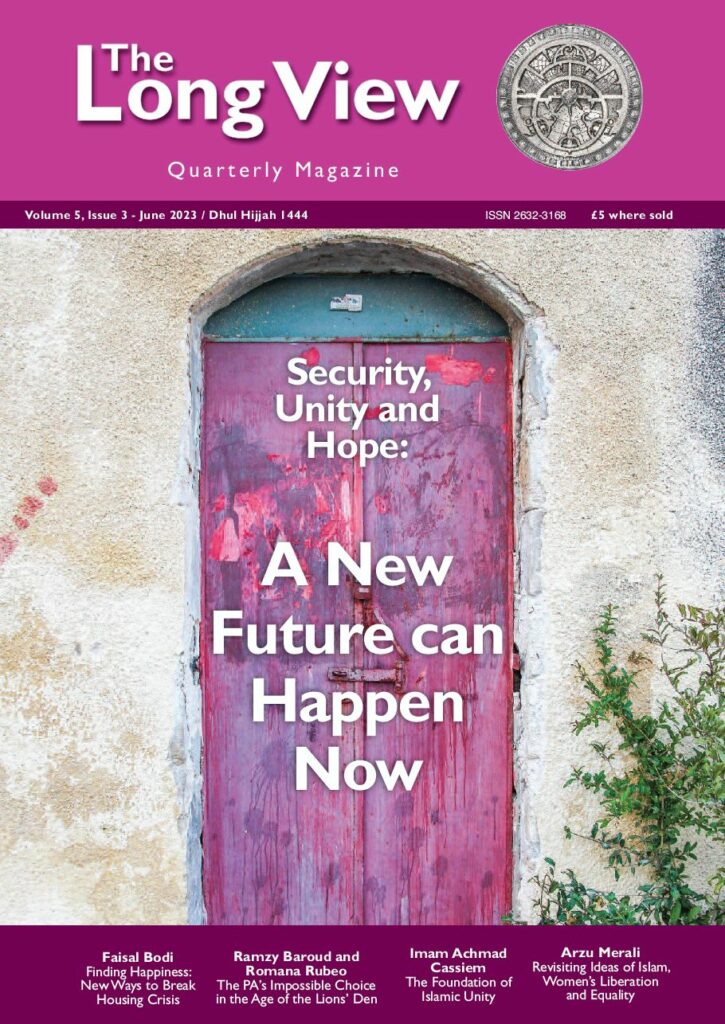Security, Unity and Hope: A new Future Can Happen Now
Volume 5 – Issue 3 – June 2023 / Dhul Hijjah 1444
Editorial
The turbulence of the current time – from the cost of living crisis to the endless killing of and violence against Palestinians (most recently the shooting and murder of two-year-old Muhammed Tamimi) by Israeli forces – can leave one feeling hopeless. The prospects for change seem distant, not for lack of innovation but lack of willpower by those with (some modicum) of power.
This issue touches on this – both the despondence but also the changes in fortune as people at the grassroots organise. Such organisation are tackling economic structures that conspire to keep people off the property ladder in countries like the UK. It is resisting the oppressions created not just by regimes like the Israeli one but their clients like the Palestinian Authority (PA). It involves overcoming the divide-and-rule mentality internalised by generations of formerly colonised people. It requires confidence in faith and belief that different ways of governance and rights can be imagined and implemented.
In our lead article, Faisal Bodi looks at the dearth of halal housing options in the UK and by extension other Western countries. It provides an analysis of the ethical dilemmas posed by conventional mortgages as a route to home ownership (in particular for Muslims), a history of solutions and the impact of a housing market of spiralling prices and an economy squeezing not just lower but also middle-income earners. Bodi’s research shows that not only are families and individuals priced out of the housing market – something that affects working-class Muslims and racialised communities disproportionately – they were also confronted with a paucity of appropriate rental stock. Overcrowding in private or the ever-diminishing and scarce social housing stock as well as extortionate rental prices, have been driving a silent but deepening crisis in Muslims and many communities of colour. The first wave of supposedly Islamic finance solutions, aimed at Muslims struggling with the ethics of conventional borrowing, did little to help and in some cases were more risky and burdensome for borrowers.
Despite this state of affairs, new ways of managing the principles of borrowing money for the sake of home ownership, whilst navigating Islam’s strict prohibition on interest, have come into being. These are the result of community-driven demands and initiatives that deal with the problems of long-term indebtedness and unequal distribution of risk – both key detriments of the previous models. However, on their own, they cannot solve the problem. Whilst state structures have consistently worked against tackling the housing crisis per se and the particularities of the crisis facing Muslims and others, it is clear that where the community and committed individuals within it have a will, there is a way. As Bodi argues, access to appropriate housing is part of a basic right to safety and security and part of the Islamic understanding of happiness.
The obstacles that prevent Palestinians from enjoying these and other basic rights are the subjects of Ramzy Baroud and Romana Rubeo’s piece. In particular, they analyse the trajectory of the Palestinian Authority (PA), as its standing as anything other than an enforcer of Israeli apartheid diminishes amongst the people of the West Bank. The proliferation of new resistance groups, including the Lion’s Den, is forcing the PA to change its public discourse to one of resistance and defiance. This discourse flies in the face of the PA’s role in effectively enforcing the Israeli occupation, as well as being a corrupt and abusive body, much criticised for its own violations of Palestinian rights. Baroud and Rubeo chart the rise of a Palestinian resistance that is uniting people across traditional factions – political, social and geographical – and leaving the PA’s position increasingly parlous. It seems that the Palestinian polity is breaking free of both Israeli fetters, and the Palestinian institutions and NGOs that were created in the wake of the Oslo Accords of the 1990s whose role (for various reasons) has been to normalise and institutionalise the occupation.
Imam Achmad Cassiem’s piece is an extract from his book, The Quest for Unity. In it, he uses Quranic ayaat and hadith to emphasise the obligation of unity between Muslims. As the Hajj approaches, these words carry much weight. As the essays in this issue show, where unity is fomented, change quickly follows.
Our final piece from Arzu Merali is a reflection on her journey as a writer and activist for women’s rights. Merali observes that since she started in this field, the discourse on rights and Islam has stagnated in ways that serve the dominant and oppressive culture of misogyny. She argues that Muslims in general, and Muslim women in particular need to challenge the way genuine issues of justice and equity have been subsumed in gender stereotypes.
There can be no just resolution for the ills our world faces without understanding that institutions, languages and everyday norms are sometimes the very things that hold us back, even when they claim to be the solutions to our problems. These are the urgent conversations and actions we need. Let’s refocus.


